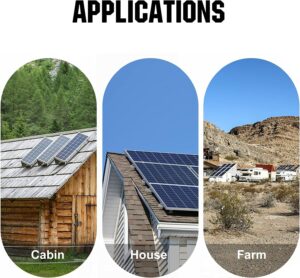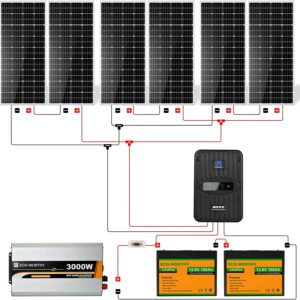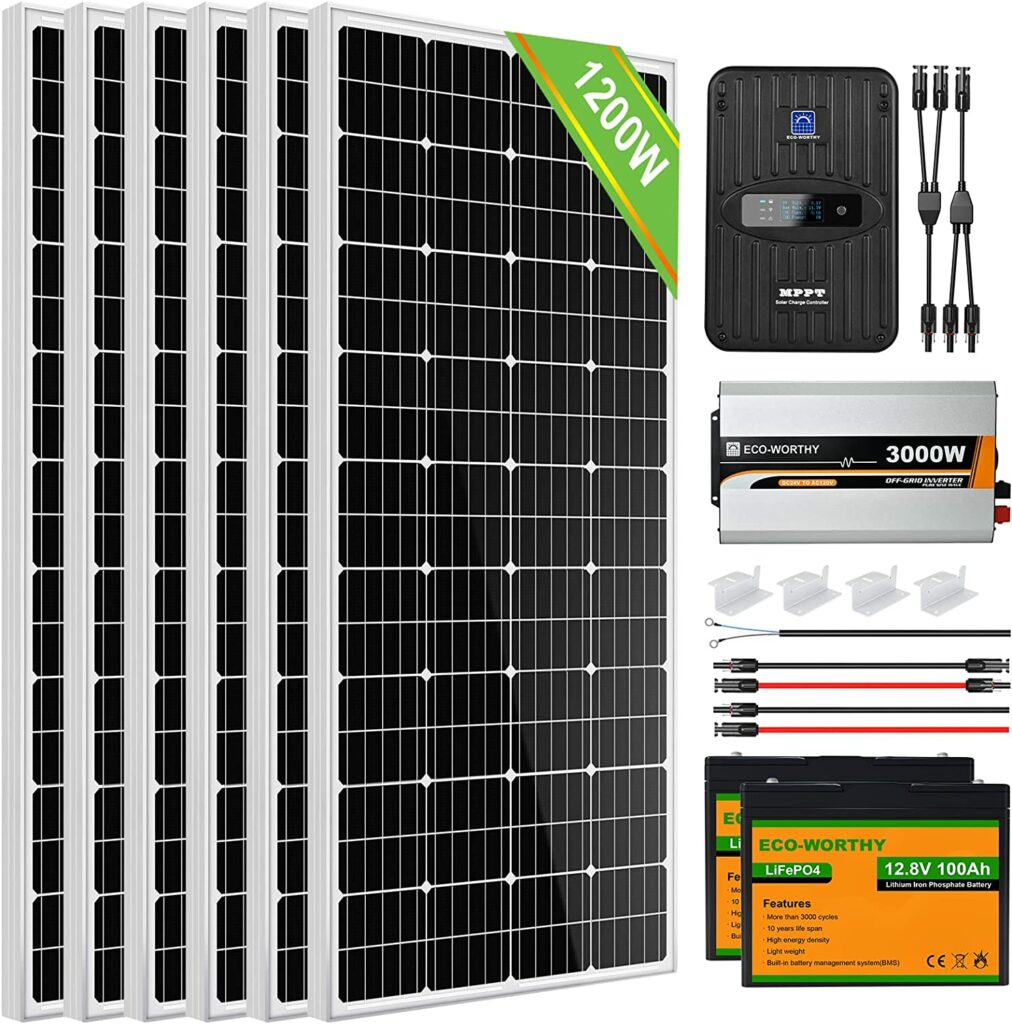Exploring the Pros and Cons of Leasing Solar Panels
We live in an era where renewable energy sources are becoming more and more popular.
Solar energy is one of the most compelling and cost-efficient ways to power our homes and businesses.
But, with the high cost of solar panels, many people are considering leasing solar panels instead of buying them.
This blog article will explore the pros and cons of leasing solar panels and how it compares to owning your own solar system.
Provo Green Products is your reliable source for discovering sustainable products that can positively impact your life and the environment.
With extensive experience in manufacturing, trades, and construction, Provo Green Products thoroughly researches each product before providing accurate and up-to-date information on its sustainability.
You can trust that you’re getting trustworthy insights to make informed choices whether you’re looking for solar products, electric bikes, eco-friendly products, renewable energy solutions, etc.
Provo Green Products is your go-to destination for finding the right green products for your lifestyle.
Disclosure: We may earn a small commission if you click on one of our links.
This does not affect the pricing of the product whatsoever.
Introduction to Leasing Solar Panels
Leasing solar panels is becoming increasingly popular, especially for homeowners and business owners who want to take advantage of the cost savings that come with renewable energy.
With a leased solar system, you don’t have to worry about the upfront cost of purchasing the panels, and you can enjoy the savings of using solar energy.
But while there are many advantages to leasing solar panels, there are also some drawbacks.
This blog article will examine the pros and cons of leasing solar panels so you can make an informed decision.

Pros of Leasing Solar Panels
Leasing solar panels have several advantages, including:
- No Upfront Cost – One of the most significant advantages of leasing solar panels is that you don’t have to worry about the cost of purchasing the panels. Instead, you can sign a lease and enjoy the savings immediately.
- Low Maintenance – You don’t have to worry about maintenance or repairs with leased solar panels. The solar company will take care of all of that for you.
- Tax Benefits – Leasing solar panels may qualify you for tax benefits and other incentives.
- Flexibility – With leased solar panels, you have more flexibility regarding the length of your lease. You can choose a term that works best for you, whether it’s a short-term or long-term lease.
- Reliability – A warranty usually backs leased solar panels, so you can rest assured that your system will be reliable for years to come.
Cons of Leasing Solar Panels
While there are many advantages to leasing solar panels, there are also some cons of solar leasing.
These include:
- High Monthly Payments – Leasing solar panels can be expensive, with monthly payments often higher than what you’d pay for a solar loan or buying the system outright.
- Limited Ownership – With leased solar panels, you don’t own the solar system. This means that you won’t be able to benefit from any potential increase in home value that comes with owning solar panels.
- Contract Restrictions – Leasing solar panels can come with contract restrictions, such as limits on how much energy you can generate and sell back to the grid.
- Early Termination Fees – If you decide to terminate your lease before the end of the term, you may have to pay an early termination fee.
- Little to No Control – With leased solar panels, you need control over the system. The solar company will decide what type of panels to install, how to maintain them, and more.
Solar Loan Versus System Lease
When deciding whether to lease or buy solar panels, it’s essential to consider the difference between a solar loan and a solar system lease.
You use a solar loan to purchase solar panels and own the system outright.
On the other hand, a system lease is a contract in which you lease the solar system from the solar company.
With a solar power system loan, you have more control over the system and can benefit from any potential increase in home value.
But you’ll have to pay back the loan over time, and you’ll be responsible for the maintenance and repairs of the system.
With a system lease, you don’t have to worry about the cost of purchasing the system, and you don’t have to worry about maintenance or repairs.
But you don’t have control over the solar system and won’t benefit from any potential increase in home value.

Monthly Payments and Financing Options
When it comes to solar panel leasing, you have several financing options.
Many solar leasing companies offer financing plans so you can choose the best for your budget.
Some companies offer low monthly payments with no down payment, while others offer higher monthly payments with lower upfront costs.
It’s essential to compare the various financing options before signing a lease, as some financing plans may better suit your needs than others.
You should also consider the length of the lease and any early termination fees that may apply.
Comparison of Solar Panel Leasing and Owning
When deciding whether to lease or own solar panels, it’s essential to consider the pros and cons of both options.
Owning solar panels gives you more control over the system and allows you to benefit from any potential increase in home value.
But you’ll have to pay the upfront cost of purchasing the system and be responsible for the maintenance and repairs.
Leasing solar panels eliminate the upfront cost of buying the system and remove the need for you to worry about maintenance or repairs.
But you don’t have control over the system and won’t benefit from any potential increase in home value.
Tax Benefits of Leasing Solar Panels
Leasing solar panels can also qualify you for specific state tax credits.
Depending on your state, you may be eligible for a tax credit or deduction for leasing a solar system.
This can reduce the cost of your lease and make it more affordable.
It’s essential to check with your state and local tax authorities to see what tax benefits you may be eligible for.
You should also check with your solar leasing company to see if they offer any tax incentives.
Considerations Before Leasing Solar Panels
Before you decide to lease solar panels, consider a few things.
First, ensure you understand the lease terms and any restrictions that may apply.
You should also consider the length of the lease, the monthly payments, and any early termination fees that may apply.
Consider the available financing options and ensure you find a plan that works for your budget.
Finally, ensure you understand the tax benefits available and check with your state and local tax authorities to see what incentives you may be eligible for.
Other Sources of Financing
In addition to leasing solar panels, consider other sources of financing.
For example, you can apply for a solar or home equity loan, which can be used to purchase solar panels outright.
You can also take advantage of the federal tax credit available in your area.
Finally, consider considering other renewable energy sources, such as wind or geothermal.
These may be cheaper and more reliable sources of energy than solar.
Conclusion
Leasing solar panels is an attractive option for many homeowners and business owners, as it eliminates the upfront cost of buying the system and the need for maintenance and repairs.
But, there are also some drawbacks to leasing solar panels, such as high monthly payments, lack of ownership, and limited control over the system.
It’s essential to consider the pros and cons of leasing solar panels.
You should also compare financing options, consider the tax benefits that may be available, and look into other sources of financing.
Doing so enables you to make an informed decision about your best option.
Ultimately, whether you lease or buy solar panels, you can enjoy solar power’s cost savings and environmental benefits.
Stay in Touch!
I’am a dedicated entrepreneur with many years of experience and an integrity-driven individual who is highly motivated to succeed. Leveraging extensive expertise in manufacturing, construction, and various trades, we can provide a solid foundation for sustainable living. Our meticulous research process guarantees that our information about each product is precise and current, allowing you to make informed decisions. A deep understanding of business operations empowers me to consistently implement improvements that result in ongoing success. Visit site.

